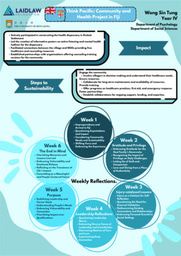Think Pacific Expedition to Fiji: Chapter 1
From feeling unprepared for the Fijian environment and scrambling to pack for the next six weeks, I found myself 4 hours away from home after the 10-hour flight to a tiny island that had never even crossed my mind before the Think Pacific project. Everything was happening, and my heart was still on an imaginary sofa, lounging, waiting for the future to happen.
We were about to head to a village along Dreketi road, near the north of Viti Levu, the largest Fijian Island (the one you'd see marked as Fiji on the map). It was an inland village, buried within the highlands, mountain tops, and winding roads. It was two clans of Indigenous iTaukei Fijian people, Vunimaqo and Waisava Settlement, sharing the same space, split in the middle by a small stream.
“What do you expect to gain from this trip?” Of course, I had a few generic answers that everyone could think of, but nothing of significance. I didn’t really expect anything. If anything, I was looking forward to how Fiji could change me, which was not a great place to start as a “changemaker”. I found myself thinking a lot about what change I could really make in the first few weeks as the project began. What change could I make, what could I really bring to the table?
More and more as I thought about what I wanted to help within the village, I started thinking about what would be well-received. That completely derailed all of my imaginations of what “helping the village” would look like. Maybe I wanted villagers to take more mental health breaks to care for their mental well-being, but what if they didn’t want that for themselves? What if taking mental health breaks is just not sustainable for how they live? Like a counselor’s protocol, one can only be helped if they want to be helped, when they come into the counseling room, presenting a problem. But what if there was no presenting problem that I could help with or nothing that I could advise that they would take into account? Who’s to say that I’m qualified to advise?
My thoughts were carelessly trailing along the shadow of voluntourism, that I wanted to do something because it was beneficial for myself, functioning off of what I’ve learnt and my own perspectives, instead of doing something that is truly beneficial for the community, or something that the community feels that it needs. What are things that are truly beneficial for the community, and how do we identify and bring those things to them? What is truly sustainable?
More and more, I stopped asking what I wanted to gain from this trip, which was a faulty question, to begin with, and started asking what I could do and keep doing to help with the cause. By the beginning of this trip, it felt as though everyone had a valid reason but me. I couldn't verbally elucidate why I took on this challenge to embark on an expedition to Fiji other than the feeling that it intuitively felt right. While it's not the most scholarly thing to say, that I had a gut feeling and I wanted it to, I felt that our standards for valid reasons (i.e. APA citations, passion stories, backgrounds) were not going to matter. It was an experience, and I just had to open my eyes. I don't have to intellectualize the purpose of opening my eyes, and my motivation for opening my eyes. I can just, do.

Please sign in
If you are a registered user on Laidlaw Scholars Network, please sign in